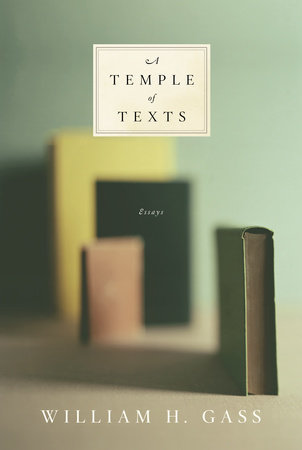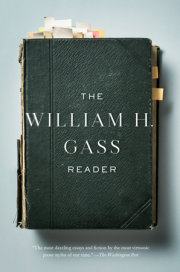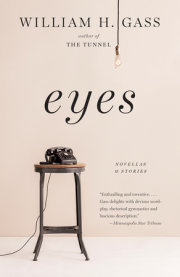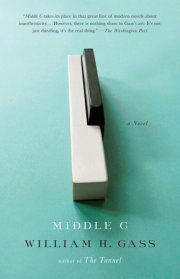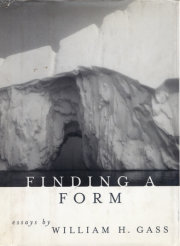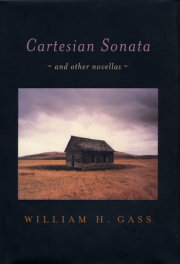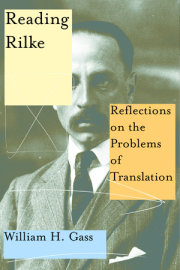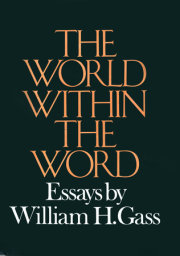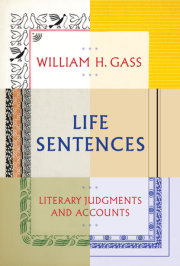To a Young Friend Charged With Possession of the Classics I’m here to tell you—speaking through the glass, between the bars, by slow post, in the babelous halls of the Academy—what you would like to hear: why, in doing what you’ve done, you’ve done the right thing.
They say you have been reading, even studying, the classics. You have been doing this at a time when not only are the classics regarded by many as one cause of our wretched world’s unjust condition but at a time when the very word classic has become suspect, and is used most neutrally now to qualify old cars in good condition or to single out products stuck in an agreeable rut while the world furiously alters around them, such as Classic Saran Wrap or Classic Coke, although original is more frequently preferred, along with old-fashioned, to describe the Colonel’s original recipe, or dad’s best girl before she became his ball and chain.
When coined in the reign of Servius Tullius during the sixth century b.c., it meant the group, among citizens, to be called upon first; that is, during a time of war, the strongest, boldest, bravest, most fit to fight; while, when the state faced choices of difficulty and moment, the wisest, most temperate, and fair; so that then, when it was used of writers, it referred to those of the first rank, and also, by an obvious step, to their works. Therefore it should now designate, with regard to the education of a citizenry still concerned with their community, the books that have most completely represented and embodied its culture, as well as those that will best instruct, enlarge, and ennoble the mind, discipline the passions, and encourage a useful and respectful approach to experience.
A classic in its field is a work with which one should begin if one expects to master its subject; something that is therefore seminal, not only begetting more books that take it as their topic but also one that contains the discipline’s founding principles, or serves as the starting point for its exploration, as Jefferson City, Missouri, once did for wagons entering our uncharted West. Even if you are in determined opposition to some traditional position, it is with the classic text you must begin the fight, though if the fight is to be fair, you must accept the risk, implicit in the inequality of the contest, of defeat, and of a turn to your heart, and of a change to your mind.
Literary classics break new ground, instigate change, or establish fresh standards of value, enlarging the scope of the canon, discovering new qualities of excellence, and confirming the importance of range, depth, mastery, and perfection in any artistic activity. It is instructive to observe that those who have carefully cultivated such a field of endeavor are not after yield per acre, but excellence per inch.
Oddly enough, people have always distrusted the classics, but it is now publicly acceptable to take pride in such distrust. We all dislike intimidation, so we worry about being overwhelmed by these tomes above which halos hover as over the graves of the recently sainted, because we wrongly believe they are fields full of esoteric knowledge worse than nettles, of specialized jargon, seductive rhetoric, and swarms of stinging data, and that the purpose of all this unpleasantness is to show us up, put us in our place, make fun of our lack of understanding; but the good books are notable for their paucity of information—a classic is as careful about what it picks up as about what it puts down; it introduces new concepts because fresh ideas are needed; and only if the most ordinary things are exotic is it guilty of a preoccupation with the out-of-the-way, since the ordinary, the everyday, is their most concentrated concern: What could be more familiar than a child rolling for fun down a grassy slope—that is, when seen by Galileo, a body descending an inclined plane? What could be more commonplace than Bertrand Russell’s penny, lying naked on an examining table, awaiting the epistemologist’s report on the problems of its perception? What could be less distinguished a subject for Maynard Keynes’s ruminations on the source of its value than such a modest coin? Why should the question—What good is that?—alarm us, or why, in an age when most of the world worships money but calls its chosen God Father instead of Chairman, Lord instead of Coach, Most High instead of Star, should we shy from the same questions Plato asked, and not ask them about our business, about our love affairs, about our lip-served gods, about democracy?
Classics are by popular accord quite old and therefore out of date; while by the resentful they are representative only of the errors of their age, their lines sewn always on the bias, their authors willing tools of power and unjust privilege. Odd, then, that the good books were usually poisons in their time, when those biased pages were burned, those compliant authors jailed, and their ideas deemed diseases of the worst kind—corruptions of the spirit—to be fought with propaganda first, followed by prison, fire and firing squad, the gallows and the stake, all at the behest of the powers in place—majesties, Popes, czars, sultans, CEOs, and CIAs—the writers’ names made to stand for Machiavellian casts of character, Marxian acts of mischief, Humean disbelief, and not for the clear-eyed hard-boiled arguments, exposures, revelations, condemnations, and realities their works contained.
The good books are the fruit of the tree of knowledge all right, and the devil is always offering us another fellow’s damned opinion, which, were we to sample it, might cause the scales to fall from our eyes, so to see suddenly that king and queen, God and all the angels, are naked, shivering, and in sore need of shoes. That is why just one good book, however greatly good, when used to bludgeon every other, turns evil; why we should be omnivorous: try kale, try squid, try rodent on a spit, try water even though there’s wine, try fasting even, try—good heavens!—rice with beans. The good books are cookbooks and good readers read them, try them, stain their pages, adjust ingredients, pencil in evaluations, warn and recommend their recipes to friends.
I think it is usually wise to approach a contemporary work with skepticism; it is the new work’s task to establish its authority, to persuade you to believe in its essential worth whatever strange or commonplace thing it may say or do. With a classic, the situation is otherwise. Arnold Bennett once wrote a little book he called Literary Taste, a work of such immense good sense, it surprised me, for I did not expect it from a devoted follower of Zola’s naturalism, an Edwardian down to his steam yacht. It is a book of admirably blunt assurance. He informs his readers, and there were many, that “your taste has to pass before the bar of the classics. That is the point. If you differ with a classic, it is you who are wrong, and not the book.” Bennett is talking about taste—the perception of excellence—not about truth. Regarding the truth, you are earnestly entreated to differ. Appreciation is Bennett’s subject and reading’s desired result. If you do not admire the writings of Thomas Hobbes, it is not Hobbes whose ghost now has to feel uneasy. Of course, adjustments must always be made. It may be that in a state of nature, since it is a state of war, the life of man is solitary, poor, nasty, brutish, and short, but in our present state of mediocrity, it is cowardly, shallow, tedious, banal, and uselessly drawn out.
The good books provide us with the most varied of intellectual diets, and not liking broccoli or squid or beets or brains or kidneys or kohlrabi is not permitted the cultivated palate, nor is a disdain for Pascal, which I confess I have, nor a dislike for Saint Paul, despite his disagreeable ideas, nor a failure to appreciate the sublime vision of Plotinus and to shiver at his ecstatic yet melancholy summation of the highest spiritual life of man—with its unbearable lightness of being—as “detachment from all things here below, scorn of all earthly pleasures, and flight of the alone to the alone.” The healthy mind goes everywhere, one day visiting Saint Francis, another accepting tea from Céline’s bitter pot—ask for two sugars, please—and hiking many a hard mile through Immanuel Kant or the poetry of Paul Celan—a pair who will provide a better workout than the local gym—before taking a hard-earned vacation in the warm and luscious fictions of Colette. You will live longer and better by consuming deliciously chewy fats and reading Proust than by treadmilling to a Walkman tune and claiming to be educated because you peruse the Wall Street Journal and have recently skimmed something by Tom Wolfe.
Nothing too much but everything a little bit—this describes the classic diet. One needs a bit of Wittgenstein to balance all that Hegel, a dash of Chekhov to counter Dostoyevsky, and some Sterne to maintain one’s sanity after a series of unscheduled encounters with Sir Walter Scott. It is a blessed variety, like that of a blooming garden: so many ways to grow, to be fruitful, to captivate, to soothe, and to be beautiful.
Emerson understood well the importance of keeping company with greatness, for you cannot improve your chess game by playing against those whom you can speedily put to rout; only when you take on opponents who can give you a sound thrashing will you learn how to win with grace. Yet, what is the goodness that makes the good books good? That confers this greatness on the great ones? Whence comes the character of “the classic” that gives it that cachet?
They glow because their authors are such fine, upstanding people from the best families, graduates of the most expensive schools, and representative of the nobler classes. When I was your age, we would have said to that suggestion: in a pig’s ear. Do you see a halo hanging over Heidegger’s head? Their authors are murderers, thieves, traitors, mountebanks, misogynists, harlots, womanizers, idlers, recluses, sots, sadists, liars, snobs, lowlifes resentful of any success, vicious gossips, gamblers, addicts, ass-lickers, parvenues, whose pretenses to nobility were (and are) notorious: for instance, the clown whose father was a highland peasant named Balssa, lately come to town, and who renamed himself Balzac after an ancient noble family, and finally put a “de” before it, as if he were parking a Rolls in front of a tenement in the belief it might cause the johns to flush—a house, when Henry James paid a visit to Tours to take in the birthplace, he found to have been recently built but already a ruin, a row house that could at least have had the dignity, he said, to be “detached”—yes, a cheap pretender, this Balzac, who would go on to create a world more orderly than God’s, almost as complete, and from beginning to end in better words, commencing with the fact that they were French. How about alleging that they glow because the good books uphold the finest ethical examples, support the highest values, display the most desirable attitudes? The way The Inferno is a testimonial to forgiveness? Or the Iliad a paean to pacifism? And by such edifying examples of revenge or the pleasure of killing an enemy, morally improving their readers, agenbiting their inwits, bestirring them to love their neighbors a bit better than themselves. Well, up a donkey’s rear to that, too. One of the many lessons our great teachers, the Nazis, taught us is that no occupation, no level of society, of wealth or education, no profession, no religious belief, no amount of talent, intelligence, or aesthetic refinement can protect you from fascism’s virus, not to mention a dozen others. It is not a contradiction for the Chaucer scholar to beat his wife, especially if she resembles the Wife of Bath.
Okay. So the glow of the good books is the glow of truth: That’s why we read them, why we treasure a play like Hamlet or a poem like Faust or a treatise like Aristotle’s Physics. Oh sure. There’s another bit of nonsense to blow out your nose. The human world has always been one of violent disagreement. This disagreement may have its source in the simple determination of who shall get what, but it expresses itself in a quarrel of customs, disputes among doctrines, in bigotry, calumny, profanation, in tribal, religious, and racial hatreds. Moreover, this divisive plurality of opinion is not just between one man and another or one segment of society or political party or sect and another, but between one era and another, one civilization and another, one way of life and—not another, but—all the others.
Just as we find formerly forged links between languages that are now apparently different, and can group them into families, some quarrelsome, some benign, we can also collect cultural opinions and practices into cliques or classes or covens; but these similarities will not save us from their contradictions, any more than folks in families stop shouting, needling, or knifing one another the moment they recognize their connections. No line is cut, no blood is spilled, more readily, more frequently, with more ardor, than the bloodline. Saturn swallowed his children because he could do it; other fathers must resort to more ordinary methods of domination and revilement. Mothers kill their children oftener than strangers do, and a brother begins to hate his brother before that brother’s born.
The opposing sides of a contradiction may both be false, we know, but only one of them can possibly be true, and this simple certainty ensures that most claims, among the Wars of the Words, are without truthful merit; that when ways of life brag of their correctness, they make such boasts against the chances; and how shall we choose between the Aztecs and the Romans, the Zoroastrians and the Hindus, or among one of seven saviors, or select from the myriad descriptions of the world, which no more resemble it than our fat aunt’s hat, the one we want to wear? No, the good books don’t sing harmony. They cannot be good because of that.
But in them, comprising them—as the atom the molecule, the molecule the compound—there are more sentences than people alive in this world, sentences that exhibit a range of savors surpassing your spice rack. Anyone who looks with care into the good books shall find in them fine sentences of every length, on every imaginable subject, expressing the entire range of thoughts and feelings possible, in styles both as unified and various as the colors of the spectrum; and sentences that take such notice of the world that the world seems visible in their pages, palpable, too, so a reader might fear to touch those paragraphs concerned with conflagrations or disease or chicanery lest they be victimized, infected, or burned; yet such sentences as make the taste of sweet earth and fresh air—things that seem ordinarily without an odor or at all attractive to the tongue—as desirable as wine to sip or lip to kiss or bloom to smell; for instance this observation from a poem of Elizabeth Bishop’s: “Greenish-white dogwood infiltrated the wood, each petal burned, apparently, by a cigarette butt”—well, she’s right; go look—or this simile for style, composed by Marianne Moore: “It is as though the equidistant three tiny arcs of seeds in a banana had been conjoined by Palestrina”—peel the fruit, make the cut, scan the score, hear the harpsichord transform these seeds into music (you can eat the banana later); yet also, as you read these innumerable compositions, to find there lines that take such flight from the world that the sight of it is wholly lost, and, as Plato and Plotinus urge, that reach a height where only the features of the spirit, of mind and its dreams, the pure formations of an algebraic absolute, can be made out; for the o’s in the phrase “good books” are like owl’s eyes, watchful and piercing and wise.
And many of these sentences the reader will wish to commit to memory in order to carry them about like a favorite tune, to hum and to encourage and guide them through bad moments, boring conversations, or bouts of insomnia. Let me cite an example from one book good as any, Frances Bacon’s Advancement of Learning, at the point where he tells us that “learning endueth mens mindes with a true sence of the frailtie of their persons, the casualtie of their fortunes, and the dignitie of their soule and vocation.” Thinking produces its own endorphins, and encountering a fine thought is as thrilling as the sight of the bluebird, partly because both have been threatened with extinction.
It is not their nouns and verbs alone that make the good books good, then; it is their adjectives and adverbs, their prepositions—their qualities and their relations.
Charles Sanders Peirce said, “My book is meant for people who want to find out; and people who want philosophy ladled out to them can go elsewhere. There are philosophical soup shops at every corner. . . .”
Respect for experience, rigor in reasoning, passion in the service of selfless ideals, every one of the human urges allowed to represent itself without apology or hypocritical disguise, the architectural impulse, too, constructing cathedrals, even countries, out of concepts, and making spaces for the imagination to soar through, high but hawk-eyed, hungry but discriminating: These qualities, rather than simply opinions and prejudices, fill the good books; but mixed with these perfections, not always easily identified, are all our failures, too, each weakness like a model on display, dressed in our most attractive, come-hither silks; here is the severe, the ugly, the sordid, the cruel, rendered by a Goya or a Grünewald, who bravely puts paint where no paint should go, who dares to depict the nightmares that shadow our sunlamp lives.
They will not do us any good—the good books—no—if by good we mean good looks, good times, good shoes; yet they still offer us salvation, for salvation does not wait for the next life, which is anyhow a vain and incautious delusion, but is to be had, if at all, only here—in this one. It is we who must do them honor by searching for our truth there, by taking their heart as our heart, by refusing to let our mind flag so that we close their covers forever, and spend our future forgetting them, denying the mind’s best moments. They extend the hand; we must grip it. Spinach never made Popeye strong sitting in the can. And the finest cookbook ever compiled put not one pot upon the stove or dish upon the table. Here, in the library that has rendered you suspect, you have made their acquaintance—some of the good books. So now that you’ve been nabbed for it, you must become their lover, their friend, their loyal ally. But that is what the rest of your life is for. Go now, break jail, and get about it.
INFLUENCE
What does Dr. Johnson’s Dictionary say? That the stars are said to influence the order of nature and the affairs of men; that when God withdraws His attention, annihilation follows; yet his Dictionary also states that a wise man has a greater grip on his own well-being than the stars can claim direction; that the effect of religion is so benign, it ought to be supported (one good deed deserves another); that inconstancy in the pursuit of our goals has a bad influence on their realization; that some consequences stain but others are easily removed; and that the truth ought to have more clout than it has. The entry does not mention advertisers, PR flacks, product endorsers, spin doctors, ghostwriters, salespersons, or other professional manipulators of opinion. In cruder, blunter times like Dr. Johnson’s, public executions were designed to deter evildoers from further crime. Now, with our advanced media skills and gulling savvy, we perform these public tasks with more sophistication and similarly vagrant results.
Of course, Dr. Johnson’s Dictionary does not actually say these things; it gives us instances of the concept’s usage; it relies on quotes that stress the importance of various influences on behavior, but lessening, if I may say so, the influence of influence as it goes along, ending with a wish rather than, as with the constellations, a prognostication. Influence ends up weaker than a compulsion or an itch. It claims responsibility for some part of what has been effected, but only as a challenge and incentive to the will. If I push a paperhanger from a ladder, I do not influence his fall, but cause it; however, if I lodge in his psyche a prior fear of falling, for instance, I have possibly predisposed his limbs; or if I have encouraged him to climb with his pastes and papers while carrying an angry dog or a kitchen cabinet, I have had a hand.
Does Dr. Johnson’s choice of authorities—Milton thrice, Rodgers twice, Prior, Sydney, Hooker, Tillotson, Addison, Atterbury also twice, Newton, each as eminent as a peak—make them influences concerning the proper use of influence or is it the doctor’s selection or Sam Johnson’s clout that does that?
Dictionaries are supposed to influence usage. Usage is what dictionaries record. “This is what we have meant,” they say; “continue in the same vein so that communication will be accurate, reliable, and fluent.” Then the next dictionary will record that fidelity, and issue the same command, which will complete the cycle. Among users, however, there are many who are incompetent, inventive, or disobedient. The French Academy tries to drive strays back into the herd. English has no comparable guardian and its speakers lack every discipline. Soon meanings have multiplied or slid or mushed, and niceties—delicate distinctions—lost along the way. In this haphazard fashion, influence has come to mean a kind of causality that operates only through the agency of a consciousness. Where this puts the stars, I’m not sure. Because of smog or city glare, we often don’t even know the stars are there.
The niceties must be observed. That means distinctions are required when considering influence as much as we might employ for any other word. Suppose my father is an angry, disappointed man. Suppose I dislike him and vow not to imitate him in anything. Yet I find that I, too, am an angry, disappointed man. His influence has been counterproductive because the opposite of my father’s behavior was aimed at, although the target was poorly struck. However, it is inadvertent, since he certainly did not intend to pass on his resentments, and they express no intention of mine, either. But he was also an accomplished public speaker—banquets and such—and I did hope to follow his lead in that regard. He ruled his classroom with an iron hand, and conveyed his scrupulosity of design to his students, some of whom showed similar qualities in their work, while others bore no evidence of it. In short, influences are positive or negative, advertent or accidental, direct or devious, general or targeted, unidirectional or reciprocal, effective or futile, actual or merely believed.
Influences are also due or appropriate and undue or improper. As the president’s adviser, if I speak the truth and report the facts, then those facts—the truth—may influence his subsequent decision, not I; but if I rhetorize and wrangle, insinuate and connive, intimidate or flatter, no matter the soundness of my suggestions otherwise, I shall have led my leader by the nose, though I was not elected to that office; and I remain responsible if I have allowed him to choose among alternatives already carefully narrowed to my purpose. All such influence is undue. If the president knows that his old crony is a truthful man—moreover, that he usually has a good command of the facts—and so follows his lead instead of the direction the data have indicated, he has made his pal’s influence inappropriate, and himself a stooge. Though if heeding another’s advice leads to success, being your own man and following your own nose is usually deemed an unaffordable luxury.
Most influence is whispered in an ear, not delivered like a push, though we do admit that liquor puts drivers under its spell, and that we’ve had to widen the crime of DWD to DUI in order to include drugs of other kinds. Driving under the influence of hubris is not yet a yellow-sheet offense.
No evil can befall a good man, Socrates said, because evil efforts achieve evil effects only when they leave their victims morally worse than they were, and for evil to do that to a good man would mean he had frailties so far unrecognized, and his character was not as stout as had been rumored. Iago plays upon Othello in a similar fashion: Once the weak key is found and repeatedly struck, the murderous chord finally sounds. Neither Plato nor Aristotle was likely to applaud those whose virtue was chiefly measured by the extent of their triumph over temptation; they thought it safer if your cashier, accountant, business manager were oblivious to beguilements.
An intelligence without integrity (a condition so often found in people of public life) is likely to succumb to the blandishments of ideology; otherwise, the mind’s inherent skepticism will guarantee its safety from superstition and other forms of sugary conjecture. Socrates knew nothing really awful could happen to him if he kept his mind free of unwarranted opinions. True strength, throughout its spectrum, shows itself through unflustered gentleness and forbearance, since only such strength has nothing to fear. The con man succeeds by exploiting the greed of his marks and is often reluctantly admired because wit is on his side, as well as discipline. His cynicism is just good sense and his nose for moral weakness is like the dowser’s wand for water. Similarly, when ill-formed or palpably false ideas make their way through the multitude, it is because the comforts they bring are so ardently desired.
If you enjoy the opinions you possess, if they give you a glow, be suspicious. They may be possessing you. An opinion should be treated like a guest who is likely to stay too late and drink all the whiskey.
Plato treated poetic inspiration as a case of such irrational infection: The gods bypass sober skill to make the pen prophetic so that the resulting poem, recited by a rhapsode similarly tranced, becomes an incitement to the mob. Or an unconscious wish, sneaky as an odor, enters the author’s awareness disguised as its opposite, and arranges the stage for a coup d’éclat. Thus the magnetic coil is closed: muse to poet, poet to page, page to performer, and performer to audience, whose applause pleases the muse, encourages the poet, and grants his forbidden desire: to rule.
This pattern repeats itself precisely with religious texts: God to prophet, prophet to his books of revelation, those to the mullahs, pastors, and the priests, priests and pastors to their congregations.
Indeed, the spread of illness was influence’s ancient occupation: It was either the source of a seizure induced by a divinity or a sickness of the system later called influenza, and because of its mysterious onset, a malady consigned to alignments of the heavenly bodies, an origin suggested by one of Dr. Johnson’s definitions. I have long suspected certain concepts of causing mental aberrations in those who entertained them (“substance,” “essence,” “soul,” or “angel,” “salvation,” “spirit,” “sin,” “transmigration,” “grace,” “phlogiston,” “zeitgeist,” and “wavicle” come to mind), and it seems to me superstitions operate on the sly, like poets and musicians, placing in our innocent ears a poisonous distillment, so that we wake to find ourselves a ghost in armor on a battlement—perhaps on an ill-fated crusade—or a victim of the stars and a casualty of the flow of macrocosmic fluid into sublunary things in somewhat the same way Greek and Latin are presently seeping into my Anglo-Saxon. I am informed that nowadays astrologers are no longer so naïve and simpleminded as to credit the constellations with all these abilities by themselves, when influences also stream from the zodiac, from planets and their angular relationships, from nodes, as well as from countless other cosmic phenomena. It’s a big world. There are sun flares. There are comets. Quarks. Strings. Holes. And viruses unidentified. Growing immune. Gathering strength.
Nowadays, instead of the stars, in place of the Fates, in lieu of the family curse, or the theory of the humors, we can cite genetic dispositions, and blame our irascibility on grandpa as automatically as we see in him our unruly red hair.
Wills (probably another unnecessary concept) . . . wills aren’t really strong or weak; it is the characters that they express and serve that are. Consequently, young people, who are often thought willful but whose natures are not yet fully formed, are most easily driven from fad to fad like sheep by dogs; or it is old people, whose minds move as unsteadily as their bodies do, who are likely to suffer the theft of their nest eggs by cuckoos, cowbirds, and other con artists. The flimflam man finds allies in the willies, the fuddles, the general neediness of his marks, and he speaks to them like a friend about their present illness, their meager widows’ portions, their imminent demise, or to youths of their acned chins, tepid dates, and dwindling desirability, to each and everyone of loneliness and laggardly self-esteem. Meanwhile, the socially defined good people—parents, an older brother, the parish priest, a teacher, the coach (we assume)—are working the right side of the street, leading by precept and example, threat and plea, toward success, licensed fornication, and financial security. We might expect, then, that literary influences, when they occur, would follow a similarly forking path of edification, seduction, and disillusionment.
Sometimes great books have deleterious consequences for other writers, creating footsteps that can’t be walked in, shade the sun can’t penetrate, expectations that have no grounds. Gabriel García Márquez’s One Hundred Years of Solitude crushed the hopes of scores of young Colombian writers, and the spread of magic realism was not exactly beneficent, since it takes a magician to work magic and because rabbits don’t hide in just anybody’s hat. Movements of most kinds flow downhill.
Bad companions, a rum crowd, pinko friends are thought to have a great deal of influence, but there is no group or figure to match, for “all aboard” magnetism, the “role model”—that “Do as I do, be as I be” advertisement for the good life. Pied Pipers are an admitted draw, but they play a different tune. Role models are to be imitated—their lifestyle aped from cereal to shoe. Pied Pipers are only to be followed. Out of town. Toward the front. And everyone’s disaster. No one asks the rats to huff a fife, just to stay in line, keep up, and step smartly.
Writers and scholars do not have role models, nor do they heed pipers; they have mentors. A mentor is a teacher who becomes a mentor by exceeding his authority and meddling with the student’s life. Writing students want mentors because their instructors are believed to have friends (that is to say, influence) in important publishing firms or are intimate with editors of important magazines. So they do their best to write as will please these persons; to flatter them by appearing to be under their wide benevolent wing (such students are said to be “teachable”); moreover, they seek out counsel from their wiser, more accomplished elders, not only on the course of careers but also on matters of the heart and the problems of life, payment for which sometimes includes the offer of sexual favors. Among the things that swell in such circumstances is the mentor’s pride at his apprentices’ achievements. Reflected glows are as good as sunlamps. To be attractive, especially if a girl or a gay person, often outstrips the need for talent, and frequently makes it unnecessary. Good looks, a little talent, and a slavish wish to please make an irresistible combination.
Copyright © 2006 by William H. Gass. All rights reserved. No part of this excerpt may be reproduced or reprinted without permission in writing from the publisher.

